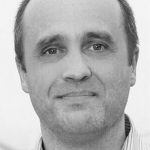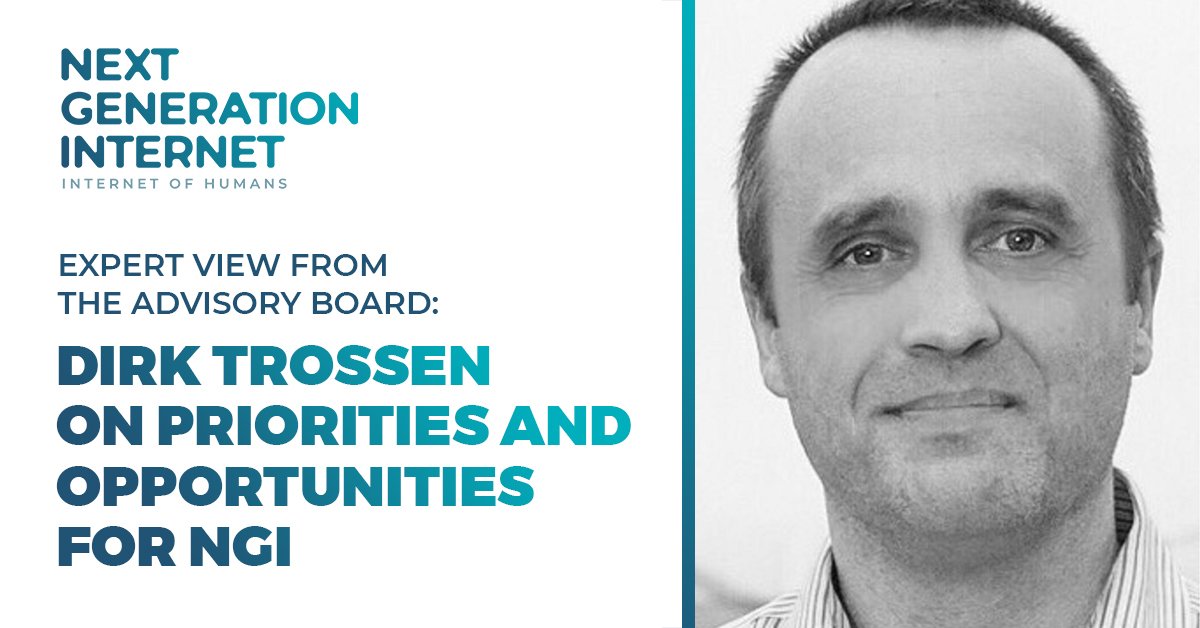 Dirk Trossen, a prominent expert in digital technologies, gives his critical view on the main research priorities and opportunities for the Next Generation Internet initiative.
Dirk Trossen, a prominent expert in digital technologies, gives his critical view on the main research priorities and opportunities for the Next Generation Internet initiative.
A more human centric Internet – how? What are the main “ingredients” needed?
I believe that an increased human centricity of the Internet will need reflection in the means for end users to control their participation in the Internet.
This control is reflected in two dimensions, namely the control over data and the control over the consumption of services. Both are related in that services usually use and generate user data but also perform computational tasks on behalf of the end user. Internet technologies today provide little to no such control for end users directly but even worse, expose user data in a manner that is being linked to known misuse, such as through enabling geo-awareness (through routing identifiers such as the IP address). While a lot of focus has been given to address user control at the application layer as well as at the policy level (with regulations such as GDPR), I believe that an evolution of foundational Internet technologies, most notably at the network layer, will need to take place to further strengthen user privacy and control. This evolution will need to move away from known shortcomings such as the sole focus on locator-based addressing of the Internet protocol (as only one of the many issues at the network layer), while enabling more direct steering of network functionality by end users through embedding service-specific metadata into packets for controlling the packet-forwarding behavior in the network. Overall, developed technologies will need to integrate with upper layer initiatives to evolve the Internet more clearly towards a personal data storage for end users, who in turn will encounter a more level playing field towards those providing services and processing end user data.
Another key aspect of human centricity is addressing the efficiency of networks in order to stymie the current increase of ICT energy consumption. With the sustainability of our planet becoming a key concern for its citizens, I believe that the evolution of Internet technologies will need to align with green policy and sustainable development goals, not only to increase acceptance of Internet technologies, but also to more generally provide a clear contribution of the ICT sector to the problem of the sustainability of our planet.
Outline your work and its relevance to the NGI ambition
Through efforts in my current workplace but also in past research activities, I have been involved in evolving digital communications towards a true cross-vertical, societal communication fabric beyond current Internet technologies as well as those many existing vertical-specific communication solutions. The vision in my current work is driven by a true interconnection of Internet and vertical technologies, tackling not only the big problems of cross-vertical new use cases in agriculture, manufacturing, transportation, but also the inclusion of new forms of human-centric interaction with improved quality of service through strict delivery bounds and increased security, envisioning holographic and multi-sensory communication being utilized for private and work life alike. My work specifically addresses aspects of network layer technologies such as hierarchical addressing schemes (to interconnect those vertical industries into a truly connected fabric of services beyond the current Internet), interconnection of computational resources (targeting the increasingly ubiquitous resource availability afforded by technologies such as 5G, optical networks and many others), as well as the security and privacy of transactions to ensure compliance with existing and emerging policy regimes, such as GDPR, at the lowest level of the infrastructure. In relevance to the NGI vision, this work contributes to the increased proliferation of ICT but also the human-centric realization of truly interconnected services that go far beyond the current Internet as we know it.
What’s your view on the rise of the data economy – driving value through the next generation of the Internet?
I believe that the future data economy, from a European perspective, must be driven by two key aspects, namely end user control and digital sovereignty. Both aspects need improvement in today’s Internet where the development of solutions has resulted in an imbalance between end user and service provider, while we have seen a strong monopoly for a number of key services that we all use in our lives. Instead, end user control over both data and service experience is crucial to tip the balance towards a level playing field, where value attached to data benefits the end users in an equal manner to service providers, while having well exposed means for end users to even deny the participation in data exchange and usage. Policy efforts, such as those embodied in the GDPR regulations, have contributed to the balance shift but I believe that also technology development must follow suit by developing solutions that remove today’s capabilities of data leakage (e.g., through the IP address identifier) and improper use (e.g., for geo-blocking content). Intrinsic security of network technologies must replace the current patchwork of security extensions for what is an inherently insecure set of original mechanisms, particularly at the lower level of the infrastructure. With that, measures at the application layer would be complemented by the appropriate measures at the network layer to result in an inherently secure system. End users must be placed at the centre of data exchange by, for instance, advocating personal data store platforms which manage the governance of end user data in the interests of end users under the constraint of wanting to engage into a transaction with service providers. Ultimately, Europe must take a stand on pushing for efforts to reform the technological foundations of the Internet to strengthen not only the data economy but to also ensure the digital sovereignty of its citizens as well as industries by providing and fostering alternatives to the solutions we use today, creating the data economy through a truly competitive marketplace in which European solutions play a visible role for end users to choose those solutions they can trust.
wHAT ARE THE MAIN RESEARCH AND INNOVATION CHALLENGES AHEAD THE ngi SHOULD FOCUS ON?
Increased smartness and efficiency are crucial challenges for NGI, addressed through the use of Artificial Intelligence deep in the network and the increased efficiency of so-called data plane technologies that make up today’s Internet. Specifically, the data plane evolution is critical for addressing the need for more efficient but also more secure (and private) networking. Overprovisioning of resources is a pain point for many network operators and ultimately not sustainable in terms of cost and efficiency. Overall, sustainability is only achieved by turning networks into smarter infrastructures while addressing the tighter requirements due to the increased proliferation in (and across) many industries. I believe that this conundrum of increasing capabilities and better efficiency will require a re-think as well as an extension of core technologies, most notably the Internet protocol itself, and the foundations that have led to their developments. Furthermore, I believe that the user-centricity of NGI will need reflection in the lower layer technologies that make up future infrastructures. A better expression of end user requirements, matched on demand against network constraints, is key to improve the overall quality of service that end users will perceive. Tantamount to this is not only a better interface between users and networks but the inclusion of users’ resources into the network itself in order to expose and utilize the increasingly ubiquitous resources to the overall pool that makes up the useable infrastructure for all end users. This development aligns with changes we see in other critical infrastructures, such as energy and transport, where end user participation has become crucial.
A greener Internet for a greener Europe – how?
Future technologies for NGI must remove the need for significant overprovisioning of resources. The so-called peak-to-average ratio of resources has become significantly larger, driven not only but largely by the move from broadcast viewing behavior (as observed for broadcast TV, for instance) to individual content consumption (through catch-up TV or over-the-top video platforms like NetFlix and many others) with the recent Covid pandemic driving this ratio increase even further. This overprovisioning, however, is not sustainable due to the resulting waste of resources. Smartness will become key in better utilizing available resources, while we expect the tradeoff between necessary expenditure for this smartness and energy efficiency to clearly tip towards better efficiency and therefore the greenness of future networks. Furthermore, the transport of information must become cheaper and more efficient. While indirections and overlays may add flexibility to quickly realize new emerging scenarios, it has also led to a myriad of complexity that drives the ever increasing energy footprint of digital communication. Only a radical re-thinking of so-called data plane technologies, most notably those related to the current Internet, will drive us towards a greener Internet, complemented by the necessary intelligence to manage and control the usage of resources.
Dr. Dirk Trossen is a Chief Network Architecture Researcher in Huawei’s 2012 Laboratories. His main responsibility lies in researching new network technologies for the Next Generation Internet through engagements within the EU-funded Horizon 2020 work programme as well as direct university relations. Dirk has more than 25 years of experience in network architectures, services and wireless technology with main contributions in the area of inter-domain networking as well as seamless handovers, physical network overlays and new service concepts for operators. He was the technical lead of the FP7 efforts PSIRP and PURSUIT, performing research on large-scale publish-subscribe information-centric systems. Prior to joining Huawei, Dirk was a Senior Principal Engineer at InterDigital Europe, Ltd, leading the network research team in the London office as the technical lead of the H2020 POINT, RIFE and FLAME projects on service-based architectures. Until April 2013, Dirk was a Senior Researcher at the Computer Laboratory of Cambridge University. Prior to this, Dirk was Chief Researcher at BT Research from 2007 to 2009 and Senior Principal Scientist with Nokia Research from 2000 to 2007. From 2009 to 2019, Dirk was also a Research Affiliate with the Advanced Network Architecture group at MIT CSAIL. He holds a Ph.D. degree in Computer Science from Technical University of Aachen, Germany and a diploma degree in Mathematics from the same university. He has published more than 85 peer-reviewed papers in international conferences and journals and holds currently more than 30 international patents in various areas. He was listed among the top 50 Industrial IoT Innovators in the 2016 RCR Wireless list.


